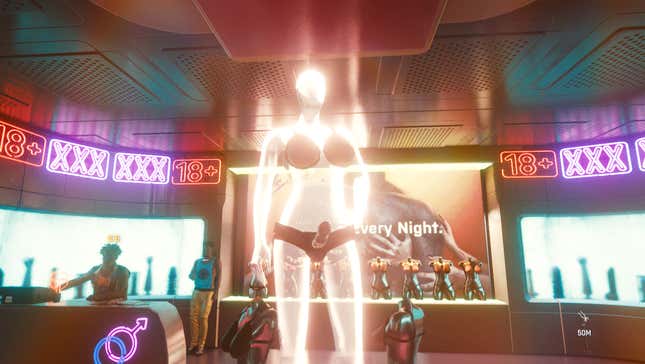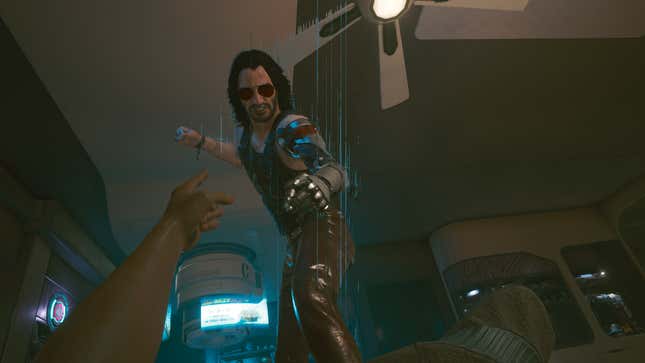
After multiple delays, reports of mandatory overtime at the studio, and a years-long, nauseating hype train inescapably intertwined with edgelord marketing tactics and transphobia, CD Projekt Red finally released Cyberpunk 2077 into the world at the tail end of last year, and almost every day of its existence since has been utterly wild and often a complete mess. Here’s a rundown of everything that happened in the game’s first month, from glitches that went viral and week-one refunds to missing seizure warnings and targeted harassment campaigns.
- Reviews and impressions went up for Cyberpunk 2077 three days ahead of its December 10 release date. Kotaku editor-at-large Riley MacLeod was full of “mixed feelings” after spending 30 hours with the sprawling open world RPG. Cyberpunk 2077 wasn’t setting new standards in storytelling or world building the way The Witcher 3 had, but it wasn’t terrible either. Some critics loved it. Others were let down. Most of them encountered plenty of bugs. All of them only had access to the PC version of the game at the time of review, something Kotaku and many other sites noted in the initial coverage. Reviewers were also prohibited from sharing any of their own captured footage of the game until it was out.
- That same day, an editor at Game Informer reported suffering a a grand mal seizure during her time with the game. “During my time with Cyberpunk 2077, I suffered one major seizure and felt several moments where I was close to another one,” associate editor Liana Ruppert wrote in a warning to other players with epilepsy. CD Projekt Red responded in a tweet the following day on December 8 that the game had a seizure warning in its EULA, but one wasn’t added to the game’s startup screen until patch 1.03 for PC went live on release day. The actual strobing effects causing the issues were later patched on December 11.

- Some reviewers were harassed online by toxic fans for not praising the game enough. GameSpot’s score of a 7.0 out of 10 was deemed insufficiently positive, while Polygon’s review was targeted for pointing out the game’s shortcomings with trans representation. The episode was just another reminder of how shitty the audience for games coverage can be, especially toward women and people from marginalized backgrounds and identities.
- When the game finally released on PC it broke records. It surpassed 1,000,000 concurrent players on its first night, and even temporarily crashed Steam. It also reached over 1,000,000 viewers on Twitch, the most ever for a single-player game. CD Projekt Red announced to investors that total sales from pre-orders alone were enough to cover its development and marketing costs.
- On console it was an entirely different story. Cyberpunk 2077 handled poorly on the PS5 and Xbox Series X/S, and was extremely glitch prone and ugly on PS4 and Xbox One. Videos showing the game’s jenky graphics and poor performance on last-gen consoles blew up on Twitter. On the back of excessive pop-in and low-quality textures, new memes were born comparing Cyberpunk 2077 to old PlayStation games.

- Some of Cyberpunk 2077’s day-one bugs were extremely entertaining. The game’s customizable dicks had a penchant for glitching out of players’ paints. Cops, meanwhile, were spawning out of nowhere, Matrix-style, hounding players no matter where they tried to escape to. There was also no shortage of NPCs t-posing in diners, dance clubs, and even on top of cars. Other shortcomings were more disappointing. Traffic looked like cardboard cutouts from far away, and cars and people would frequently disappear when you turned your back.
- Despite all of this the game ran surprisingly well on Stadia. The game had better graphics and fewer crashes than on some consoles, with Digital Foundry eventually suggesting the Stadia version of Cyberpunk 2077 was nearly on par with the Xbox Series X version. Google even had to stop its promotion giving away Stadia founder’s editions with copies of the game because it quickly ran out.
- CD Projekt Red changed its incentive structure so Cyberpunk 2077 developers would still get bonuses, despite some poor review scores. “We initially had a bonus system that was focused on the game’s ratings and the release date, but after consideration, we believe that measure is simply not fair under the circumstances,” studio head Adam Badowski told staff in an email, according to a report by Bloomberg on December 11.
- Players began reporting getting refunds for the game within just days of release. Claims that the game was “broken” on both console and PC led to at least some players getting their money back from platforms like Steam and the Microsoft Store during Cyberpunk 2077’s launch weekend. “Got my refund from Microsoft after playing for almost 2 hours,” wrote one person on Reddit. “I was surprised they didn’t hassle me about it.”

- CD Projekt Red officially started apologizing for the state of the game on base consoles by December 14. “First of all, we would like to start by apologizing to you for not showing the game on base last-gen consoles before it premiered and, in consequence, not allowing you to make a more informed decision about your purchase,” the studio wrote on Twitter. It promised the game would be improved in later patches, but also promised refunds to players who didn’t want to wait.
- But the refund situation on consoles was a mess. Following CD Projekt’s Red guidance, some players attempted to get refunds from Microsoft and Sony but were denied. The studio later clarified in a call with investors that no special refund policy had been put in place, and everyone was still subject to the platform holders’ existing draconian terms.
- During the same investor call the studio also tried to explain why it had kept the terrible console version hidden from the public. “We definitely did not spend enough time looking at [PlayStation 4 and Xbox One performance],” vice president Michał Nowakowski said during the call, with billionaire co-CEO Marcin Iwiński claiming the console version wasn’t shown because the studio was working on it right up until release day. Of course, this was contrary to everything CD Projekt Red had said about the game in the years and months leading up to launch.
- In the midst of all this, Cyberpunk 2077’s popularity on Twitch filled streams with nudity as it got a pass from the platform’s normal rules. In addition to the regular sex scenes and glitched dicks, players noticed the game was also overflowing with dildos. Senior quest designer Philipp Weber explained that part of that was due to dildos dropping as random loot. “We’re going to adjust them so that the dildos don’t appear too out of place/context and distracting and more where they should be by design,” he told Kotaku over email.

- CD Projekt Red changed its messaging on December 16 and stopped telling customers to seek refunds through Sony. “If you own a digital copy of the game on Xbox, visit this Xbox support article for detail on how to refund,” read an email from the studio’s “helpmerefund” address. “If you own a digital copy on PlayStation, please wait for us to get back to you.” CD Projekt Red gave players until December 21 to formally request a refund.
- The next day (and only a week from launch) Sony pulled Cyberpunk 2077 from the PlayStation store. In addition, Sony said it would guarantee refunds to anyone who already purchased the game and wanted one. CD Projekt Red put out a statement saying that the decision to remove the game from Sony’s storefront was made by the platform holder following discussions about issuing full refunds.
- Meanwhile, the game’s developers grilled management over working conditions and its troubled launch during a digital all-hands meeting. “Developers asked blunt questions about the company’s reputation, the game’s unrealistic deadlines and the relentless overtime in the months and years leading up to the game’s Dec. 10 release,” Bloomberg reported.
- By December 18, options for full refunds expanded to the Microsoft Store, and even some brick and mortar retailers. “To ensure that every player is able to get the experience they expect on Xbox, we will be expanding our existing refund policy to offer full refunds to anyone who purchased Cyberpunk 2077 digitally from the Microsoft Store, until further notice,” a spokesperson for the company announced in a statement. Similarly, Best Buy said it would accept returns for the game even if copies of it had already been opened. A few days later, Kotaku received reports that GameStop was doing the same.

- The whole mess blew up so much that not even The New York Times could resist doing a story about it. The hallowed daily put two reporters on it, including verteran tech writer Mike Isaac, and published its conclusion on December 19: “Cyberpunk’s rollout is one of the most visible disasters in the history of video games—a high-profile flameout in the midst of the holiday shopping season by a studio widely considered an industry darling.” The paper of record also claimed in the initial version of the story that game developers usually send out review copies of games “months in advance.” It later updated that to “with ample lead time,” which is still often wrong.
- Sports blog and media worker collective Defector called video game reviewers who signed Cyberpunk 2077’s pre-release NDA “sellout clowns.” “[R]eviewers who signed the NDA abandoned any claim to adversarial journalism, as well as any utility they might have had to their readers, and are clowns,” Albert Burneko wrote, kicking off a complete self-dunkfest on Twitter, but also some worthwhile discussion about the nature of review embargos and the video game media’s relationship to the industry that creates them. The whole thing culminated in a much more interesting Q&A with former Kotaku senior critic Heather Alexandra on December 29.
- Despite the clusterfuck, Cyberpunk 2077 went on to sell a ton. CD Projekt Red announced on December 22 that even counting refunds, the game had already sold 13 million copies. The initial sales numbers weren’t enough to quell investors, however, and led the company’s stock dropping another 3.7%, down a total of 42% from where it had peaked early in the month.
- A hotfix went out the next day to address a bug that had been corrupting players’ saves. The update improved “memory management and stability,” addressing an issue where save files that grew over 8 MB started having problems. Prior to the fix players were told to simply limit the number of items in their inventory and not craft so much.

- A Manhattan law firm announced a class action lawsuit against CD Projekt Red on Christmas Eve. The lawyers charged the company with making false statements to investors about the quality of the game prior to launch, and wrote in a December 24 press release that they’d represent any “persons or entities who purchased or otherwise acquired publicly traded CD Projekt Red securities between January 16, 2020, and December 17, 2020.”
- Players created a third-person mode and all sorts of other mods. These ranged from improvements to jokes. Uploaded on January 2, Jelle Bakker’s mod turned Cyberpunk 2077 into the sort of normal third-person open world game you might expect from the makers of The Witcher 3. It also let you see all of your custom outfits all of the time. Another mod by homes432 added barbers to the game so you could actually change your haircut whenever you wanted.
- Cyberpunk 2077 players also discovered how to go really, really fast. YouTuber Max Dakka used maneuvering systems and reinforced tendons cyberware mods to make it so their character could dash and do mid-air rolls, eventually building up enough momentum and speed to run faster than a car.
- By January 5, the game lost close to 80% of its initial concurrent player-base on Steam. This was partly a reflection of just how high the numbers started out. Despite the massive drop-off, Cyberpunk 2077 was still averaging more concurrent players than The Witcher 3’s all-time peak.
- CD Projekt Red uncharacteristically took to Twitter to denounce rumors about the game’s troubled development circulating in a Reddit thread on January 6. “Normally we don’t comment on rumors but this time we wanted to make an exception as this story is simply not true,” the company wrote.
- Poland’s Consumer Protection office (UOKiK) announced on January 9 that it would investigate Cyberpunk 2077’s development, marketing, and post-launch fixes to see if people were misled. If the regulator foundanything awry it could slap CD Projekt Red with fines of up to 10% of annual revenue.
And that’s where we are now. Cyberpunk 2077 still isn’t available to buy on the PlayStation Store, and is still not in great shape on consoles. Players are currently waiting on the game’s 1.07 patch, which is expected to be one of its bigger since release, and potentially kick-off the game’s long road to some potential No Man’s Sky-style redemption arc. Meanwhile, PC players are waiting on the game’s eventual multiplayer DLC, and the game’s free next-gen upgrade is also in the pipeline. What this means for those working hard hours on the floor at CD Projekt Red—last year to ship the game, and this year to fix it—remains to be seen.